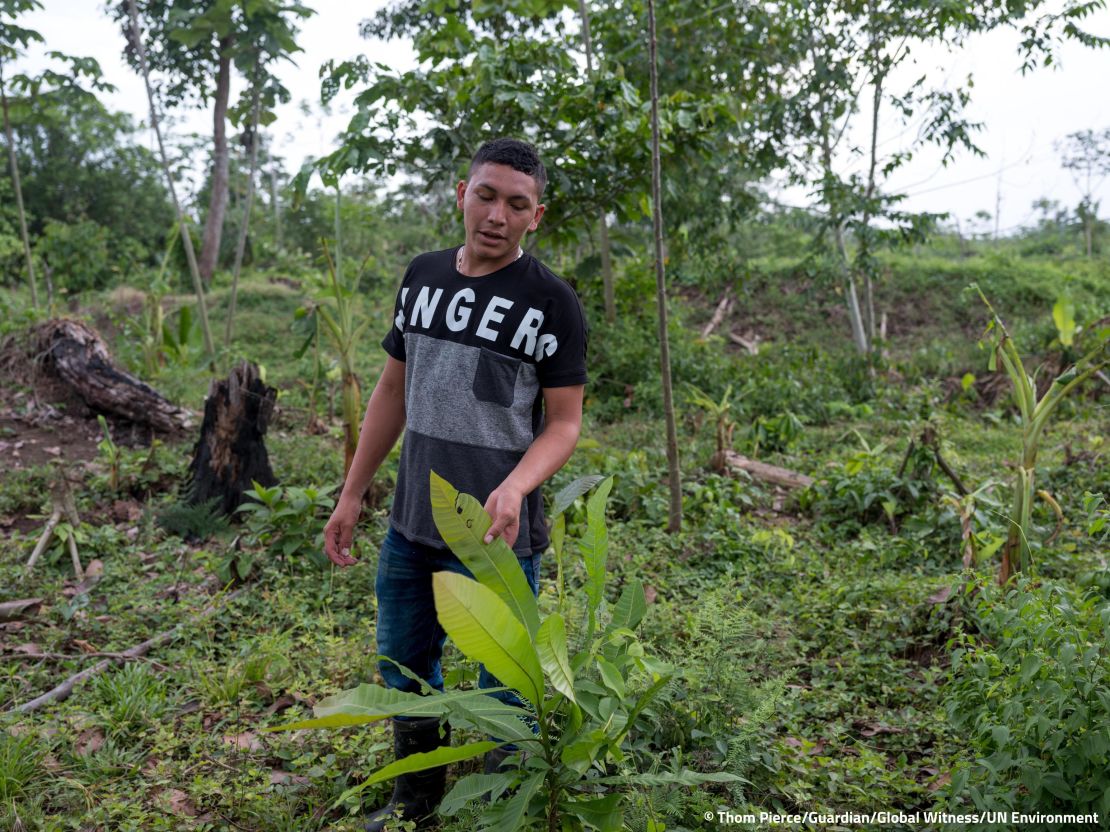At 18, Ramón Bedoya already has two bodyguards and a bulletproof vehicle provided by the Colombian government for his protection.
But he says it’s not enough. He fears for his life and that of his family after his father, Hernán Bedoya, was threatened on numerous occasions before being killed in December.
His father was reportedly shot 14 times for protecting community lands from businesses interested in palm oil agriculture in the western region of Colombia’s department of Chocó.

The younger Bedoya remembers fighting alongside his father since he was 8, defending the territory despite being displaced from their land twice.
“I decided to keep fighting because he always showed me the way,” Bedoya says of continuing the struggle after his father’s death.
“He always wanted me to follow his steps, to take care of nature, the land, human rights, and that is what I do,” he told CNN in a voice message. “I continue to fight.”
Report points to agribusiness link to activists’ deaths
Global Witness, an environmental nongovernmental organization, released findings Tuesday highlighting 2017 as the deadliest year for environmental activists on record, with at least 207 people killed. Its 72-page report is called “At What Cost? Irresponsible business and the murder of land and environment defenders in 2017.”
Nearly 60% of these killings occurred in Latin America, Global Witness reported, with 57 deaths in Brazil and 24 in Colombia.
According to its investigation, “more massacres occurred in 2017 than ever before.”
On one occasion, an assault in Brazil by farmers against an indigenous community left 22 injured, “some with their hands cut off.” The report blasts Brazil’s government, saying “nobody had faced justice for this appalling incident, reflecting a wider culture of impunity and inaction to support defenders by the Brazilian government.”
In a statement, Brazil’s government said the report findings were “wrong, inflated, fragile and methodically doubtful,” calling the denunciations in plain English “fake news.”
Ben Leather, a senior campaigner at Global Witness and author of the report, told CNN that agribusinesses are surpassing mining sectors as the main link to the activists’ killings.
“What we have pretty clear in our research is that governments and businesses are colluding to grab land for large-scale agribusiness in the hope of turning a quick profit, responding to consumer demand,” Leather said.
In the case of Bedoya and his family, palm oil is of high value and a commodity in many products consumers buy around the globe such as soap, makeup and even ice cream.
“One of the most shocking facts outlined in this report is the number of killings committed by government security forces at the behest of their political bosses and in league with industry,” Global Witness says.
Data from Global Witness allege that security forces “were linked to around a quarter of the murders last year – 30 linked to the army and 23 to the police,” its report says.
“Standing up to powerful actors to protect your land or the environment should not mean having to put your life on the line,” said Erika Guevara-Rosas, director of the Americas at Amnesty International, in response to the Global Witness report.
Colombia’s dark past
Colombia’s situation has worsened since the 2016 peace treaty between the government and rebel group FARC, according to Global Witness, which finds a “power vacuum” in land once operated by the guerrilla group. People who had been displaced from their lands are returning to find new groups occupying the areas.
“This scenario is complicated further as criminal groups move into areas the FARC once occupied, to carry out illegal logging, mining and cattle ranching. The government’s push for foreign investment has also intensified this scramble for land,” the Global Witness report says.
Every year, Colombia is in the top three deadliest countries for land defenders, according to Global Witness.
Bedoya says guerrilla factions and paramilitaries continue fighting, displacing more people.
“I want the world to know what is happening internally in Colombia,” Bedoya says. “The government says they’re giving back the land, but they’re not.”
Last week, the Inter-American Commission on Human Rights also condemned the violence and “murders of human rights defenders and social leaders in Colombia,” urging the government to take measures for protecting those who fight defending their country.
“(Forty-six) human rights defenders were murdered in the country during the first quarter of 2018,” said the commission, an autonomous organ of the Organization of American States.
CNN reached out this week to Colombia’s Interior Ministry multiple times for comment but did not receive a statement.
Bedoya’s fight is far from over, but he says he refuses to give up. His father “always fought for human rights, for the water, for nature, so that no one would exploit it,” he says.
Leather says that “people should not have to die or be threatened just for protecting their land – our environment.”
“The reason why they’re at risk is because governments around the world are consistently colluding with big business to turn a big profit at the expense of human life. We the consumers need to stand up and say that is not acceptable.”




